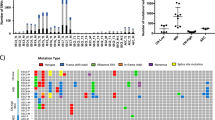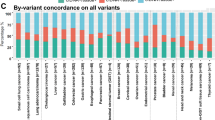Abstract
Although endometrial adenocarcinoma is usually treated with surgery, patients with metastatic disease have a poor prognosis. To address the need for better treatment options, molecularly targeted drug therapies are being developed. These targeted therapies rely on accurate mutational profiling of the tumor, which is most often performed on DNA from the primary tumor. Our objective was to compare mutational concordance in primary tumors with their metastases. We genotyped 11 pairs of primary and metastatic endometrial adenocarcinomas using DNA from formalin-fixed paraffin-embedded tissue blocks and semiconductor-based next-generation sequencing. Five of these cases had multiple metastases for comparison. We sequenced 37 known cancer genes that are targets for new drug therapies. A total of 62 mutations were identified in 16 of these 37 genes. The most common mutations were in PIK3CA and PTEN. Overall, there was a 53% discordance in mutations between primary tumors and their paired (33 of 62). The absence of mutations in metastases (25 of 33, 76%) compared with the primary neoplasm was more common than gain of mutations (8 of 33, 24%). There was a 15% discordance rate between paired metastases within individuals (6 of 40), which was significantly less frequent than the rate between primary tumors and their metastases (Fisher exact P value <.0001). Although the sample size is relatively small, our data suggest it may be prudent to test metastases, rather than the primary neoplasm, when using molecularly targeted drug therapies, because isolated metastases may lack mutations detected in the heterogeneous mixture of the tumor’s origin.
Similar content being viewed by others
References
American Cancer Society. Cancer Facts & Figures 2014. Atlanta, GA: American Cancer Society; 2014.
Howlader N, Noone AM, Krapcho M, et al. eds. SEER Cancer Statistics Review, 1975–2013. Bethesda, MD: National Cancer Institute, http://seer.cancer.gov.
Levine RL, Cargile CB, Blazes MS, van Rees B, Kurman RJ, Ellenson LH. PTEN mutations and microsatellite instability in complex atypical hyperplasia, a precursor lesion to uterine endometrioid carcinoma. Cancer Res. 1998;58(15):3254–3258.
Oda K, Stokoe D, Taketani Y, McCormick F. High frequency of coexistant mutations of PIK3CA and PTEN genes in endometrial carcinoma. Cancer Res. 2005;65(23):10669–10673.
Slomovitz BM, Broaddus RR, Burke TW, et al. Her-2/neu overexpression and amplification in uterine papillary serous carcinoma. J Clin Oncol. 2004;22(15):3126–3132.
Konecny GE, Santos L, Winterhoff B, et al. HER2 gene amplification and EGFR expression in a large cohort of surgically staged patients with nonendometrioid (type II) endometrial cancer. Br J Cancer. 2009;100(1):89–95.
Lax SF, Kendall B, Tashiro H, Slebos RJ, Hedrick L. The frequency of p53, K-ras mutations, and microsatellite instability differs in uterine endometrioid and serous carcinoma: evidence of distinct molecular genetic pathways. Cancer. 2000;88(4):814–824.
Garcia-Dios DA, Lambrechts D, Coenegrachts L, et al. High-throughput interrogation of PIK3CA, PTEN, KRAS, FBXW7 and TP53 mutations in primary endometrial carcinoma. Gynecol Oncol. 2013;128(2):327–334.
Dedes KJ, Wetterskog D, Ashworth A, Kaye SB, Reis-Filho JS. Emerging therapeutic targets in endometrial cancer. Nat Rev Clin Oncol. 2011;8(5):261–271.
Mirkovic J, Sholl LM, Garcia E, Lindeman N, et al. Targeted genomic profiling reveals recurrent KRAS mutations and gain of chromosome 1q in mesonephric carcinomas of the female genital tract. Mod Pathol. 2015;28(11):1504–1514.
Wan L, Pantel K, Kang Y. Tumor metastasis: moving new biological insights into the clinic. Nat Med. 2013;19(11):1450–1464.
Stoecklein NH, Klein CA. Genetic disparity between primary tumours, disseminated tumour cells, and manifest metastasis. Int J Cancer. 2010;126(3):589–598.
Aparicio S, Caldas C, The implications of clonal genome evolution for cancer medicine. N Engl J Med. 2013;368(9):842–851.
Warth A, Macher-Gooppinger S, Mulley T, et al. Clonality of multifocal nonsmall cell lung cancer: implications for staging and therapy. Eur Respir J. 2012;39(6):1437–1442.
Gerlinger M, Rowan AJ, Horswell S, et al. Intratumor Heterogeneity and branched evolution revealed by multiregion sequencing. N Engl J Med. 2012;366(10):883–892.
Beadling C, Neff TL, Heinrich MC, et al. Combining highly multiplexed PCR with semiconductor-based sequencing for rapid cancer genotyping. J Mol Diagn. 2013;15(2):171–176.
Krakstad C, Birkeland E, Seidel D, et al. High-throughput mutation profiling of primary and metastatic endometrial cancers identifies KRAS, FGFR2 and PIK3CA to be frequently mutated. PLoS One. 2012;7(12):e52795.
Poplawski A, Jankowski M, Erickson S, et al. Frequent genetic differences between matched primary and metastatic breast cancer provide an approach to identification of biomarkers for disease progression. Eur J Hum Genet. 2010;18(5):560–568.
Salvesen HB, Stefansson I, Kalvenes MB, Das S, Akslen LA. Loss of PTEN expression is associated with metastatic disease in patients with endometrial carcinoma. Cancer. 2002;94(8):2185–2191.
Author information
Authors and Affiliations
Rights and permissions
About this article
Cite this article
Bergstrom, C.P., De Geest, K., O’Gara, R. et al. Discordant Mutations in Paired Primary and Metastatic Endometrial Adenocarcinomas Identified by Semiconductor-Based Sequencing for Rapid Cancer Genotyping. Reprod. Sci. 23, 1575–1579 (2016). https://doi.org/10.1177/1933719116648213
Published:
Issue Date:
DOI: https://doi.org/10.1177/1933719116648213




